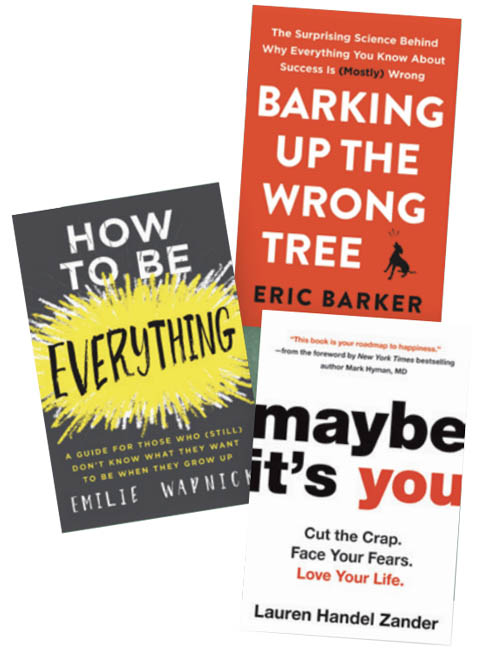Barking Up the Wrong Tree: The Surprising Science Behind Why Everything You Know About Success Is (Mostly) Wrong
by Eric Barker, Harper One, 2017
How to Be Everything: A Guide
for Those Who (Still) Don’t Know What They Want to Be When They Grow Up
by Emilie Wapnick, Harper One, 2018
Maybe it’s You: Cut the Crap.
Face Your Fears. Love Your Life
by Lauren Handel Zander, Hachette, 2017
Reviewed by Susan Fader, susanfader@faderfocus.com
Fader & Associates, Teaneck, NJ
Motivational/self-help/business books are popular because many people are looking for that kick in the pants that will lead them to greater success and happiness. The authors of the books reviewed here have three different takes on what the roadblocks in a person’s life could be and use different approaches to motivating the reader to an epiphany and positive change.
These authors share similar credentials. They all have blogs, have given TED Talks, have a cheeky writing style, give the reader assignments, and have an affinity for really long book titles!
Barking Up the Wrong Tree: The Surprising Science Behind Why Everything You Know About Success Is (Mostly) Wrong, by Eric Barker focuses on what the author feels are current misconceptions or myths about what makes an individual successful. Using memorable stories and scientific studies to support his recommendations, Barker explores which pathways can lead to success, some of which run counter to current thinking. The author acknowledges that different individuals need different pathways to success and explores many real-life situations, such as: Should you play by the rules versus being a risk taker? How important is what you know versus who you know? And, how you should deal with the time at work versus the work/life balance?
I found some other interesting insights in a discussion of why valedictorians tend not to be superstars in the real world and the role of grit in success, i.e., the ability to convince oneself to continue going in the face of adversity and how one could create a stronger grit mindset. This is a fast-paced read that will help the reader understand ways they can become more successful.
While Barking Up the Wrong Tree suggests that specialization leads to success, the thesis of Emilie Wapnick’s How to Be Everything: A Guide for Those Who (Still) Don’t Know What They Want to Be When They Grow Up is that specialization is not for everyone and that some people, whom she calls multipotentialites, have “many different interests and creative pursuits in life” and do not have “one true calling” the way specialists do.
Wapnik feels giving oneself permission to not specialize can set one free but also recognizes that a major frustration for multipotentialites is how they can create the proper balance and structure so that they can be successful while pursuing many different endeavors. She uses a warm and encouraging tone when providing a practical framework where multipotentialites can create a successful and happy life by embracing all their passions versus forcing them to choose only one.
While multipotentialites of any age could benefit from reading this book, those at the beginning of their careers. where they might still be trying to still figure out what they want to do “when they grow up,” and those who may be at the crossroads of a career change would especially benefit from reading this book.
In Maybe It’s You: Cut the Crap. Face Your Fears. Love Your Life, Lauren Handel Zander uses the drill sergeant/take-no-prisoners approach of tearing you down and then rebuilding you. The premise of the Handel Method is that you need to confront and acknowledge that part of how you currently perceive yourself is wrong before you will be able to really rebuild/change. She validates the truth of her approach by the fact that 35 universities and institutes of learning, including MIT, use this method. Her language and examples can be salty, and her chapters are built around specific assignments that one is supposed to do.
While some may find the number of writing and introspective assignments onerous, it is helpful and insightful that at the beginning of the book, the author introduces you to four different clients with different personas, issues, and needs. The reader will probably connect with at least some of the different personal descriptors. The author then shares how the four clients initially answered an assignment, why their initial responses were avoidance/wrong, and then, using the Handel Method, how their perspectives are changed and the responses rephrased to help the clients move forward. I found those examples to be very insightful even when not doing the assignments.


Be the first to comment